Our Australian first development of abamectin resistant Orius-A is good news for growers
Wednesday, July 10, 2024
We're excited to launch Orius-A, the new beneficial we have developed for Australian growers that can withstand abamectin sprays used to control Broad Mite in capsicums.
Broad Mite (Polyphagotarsonemus latus) attacks a wide range of hosts including many tropical and subtropical fruit, cotton, berries, greenhouse crops such as capsicums, eggplants, flowers, and ornamentals.
Unlike spider mites, Broad Mite cannot be seen with the naked eye, only with a hand lens. They thrive in warm humid conditions. Broad Mite is particularly troublesome in greenhouse capsicums where it attacks the new growth tips, leaving it curled and distorted. If the infestation is not controlled quickly, the damage can be widespread, growth stops completely and takes a long time to recover, if at all.
Broad Mites are not similar or related to spider mites (eg, Two-Spotted Mite), but belong to an entirely different mite family, the tarsonemid mites. Therefore, biological and chemical control methods are different from those used against spider mites. The predatory mites Neoseiulus cucumeris (Cucumeris) and Neoseiulus californicus (Californicus) can control Broad Mite, especially where pest levels are initially low and conditions are humid.
Biological control of Broad Mite is difficult where warm and dry conditions prevail, forcing growers to rely on abamectin-containing miticides for control.
Integrated Pest Management (IPM) programs for greenhouse capsicums and strawberries rely on Orius tantillus (Orius) and Cucumeris or Typhlodromips montdorensis (Monty) for thrips control. Orius is by far the most important component of the IPM program, especially in places like Virginia (SA) where Western Flower Thrips pressure is extremely high and the incidence of Tomato Spotted Wilt Virus is widespread. Orius populations decrease significantly after an abamectin spray for broad mite control, thereby allowing the Western Flower Thrips to return to the crop.
If only there was a way to retain the Orius and control the Broad Mite at the same time.
Pest management professionals and growers constantly discuss the problem of pesticide resistance developing in key pests. By the same token, you could deliberately develop pesticide resistance in key beneficials to allow them to survive and function better in a particular environment. This is exactly what Biological Services has done with our Orius.
In 2020 Lachlan Chilman, company director at Biological Services, recognised this need and set out on the arduous journey to develop an abamectin-resistant strain of Orius. “It wasn’t easy and it’s taken a long time, but I am happy we got there in the end,” said Lachlan. "The new strain of Orius is called Orius-A and is only available from Biological Services."
Field trials conducted in Virginia last year showed significantly better Orius-A survival after an abamectin spray compared to the sensitive strain.
“We now have an Orius that can withstand the abamectin sprays aimed at the Broad Mite. It is a big win for the IPM growers in Virginia,” Lachlan continued.
James Altmann agreed, “There is nothing like Orius-A in Australia. At Biological Services we constantly think of ways to improve our value proposition to our growers. Orius-A will also be valuable in other flowering crops like strawberries where abamectin treatments are needed for Broad Mite, Cyclamen Mite, and foliar nematodes. “
You can buy Orius-A through your Biological Services IPM Consultant or by calling 08 8584 6977. We generally need several weeks’ notice to prepare the Orius-A. Orius-A is available to all growers who would like to use it. Contracts are not required. Please remember to always discuss any sprays with your Biological Services Consultant.





